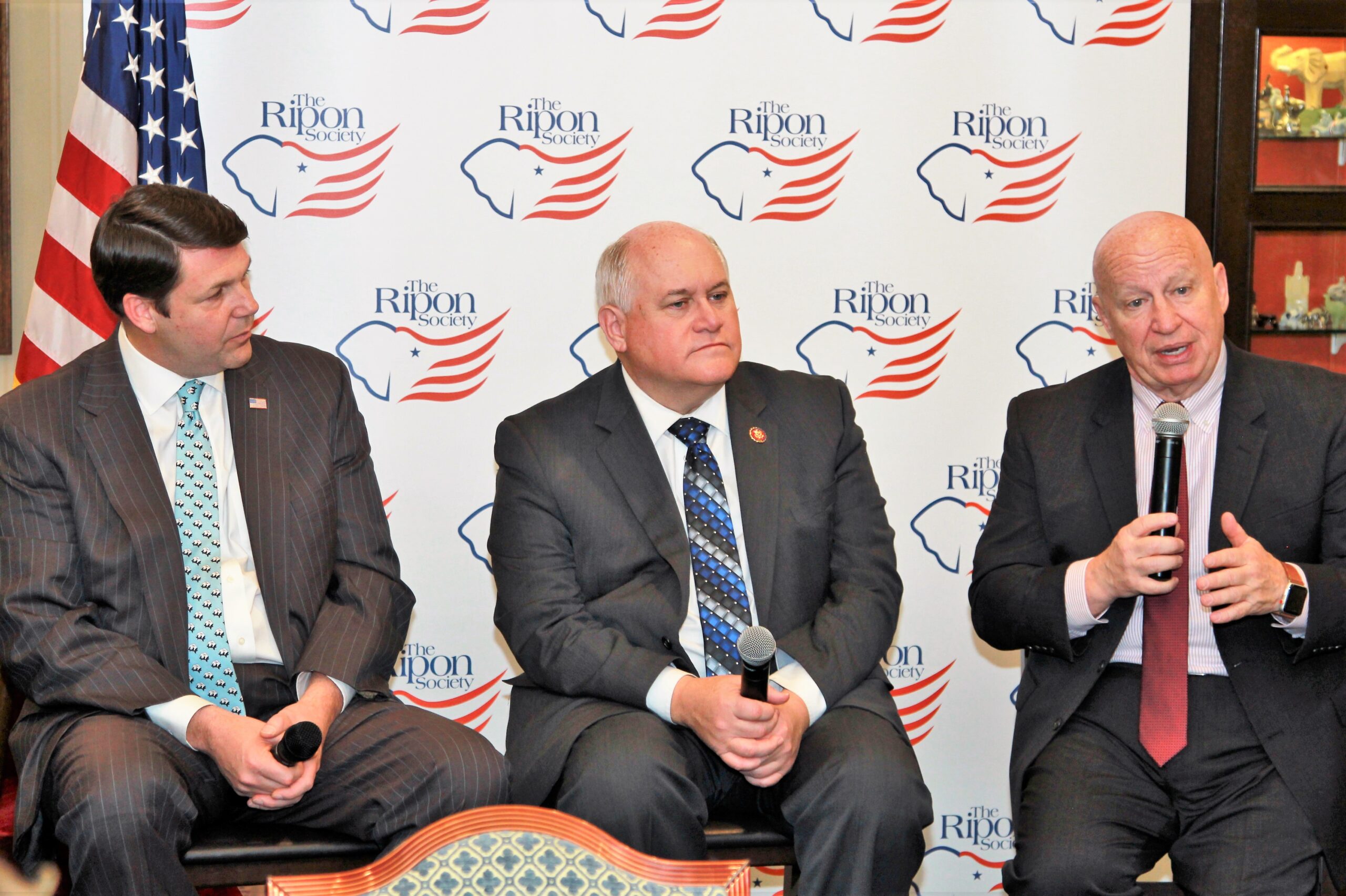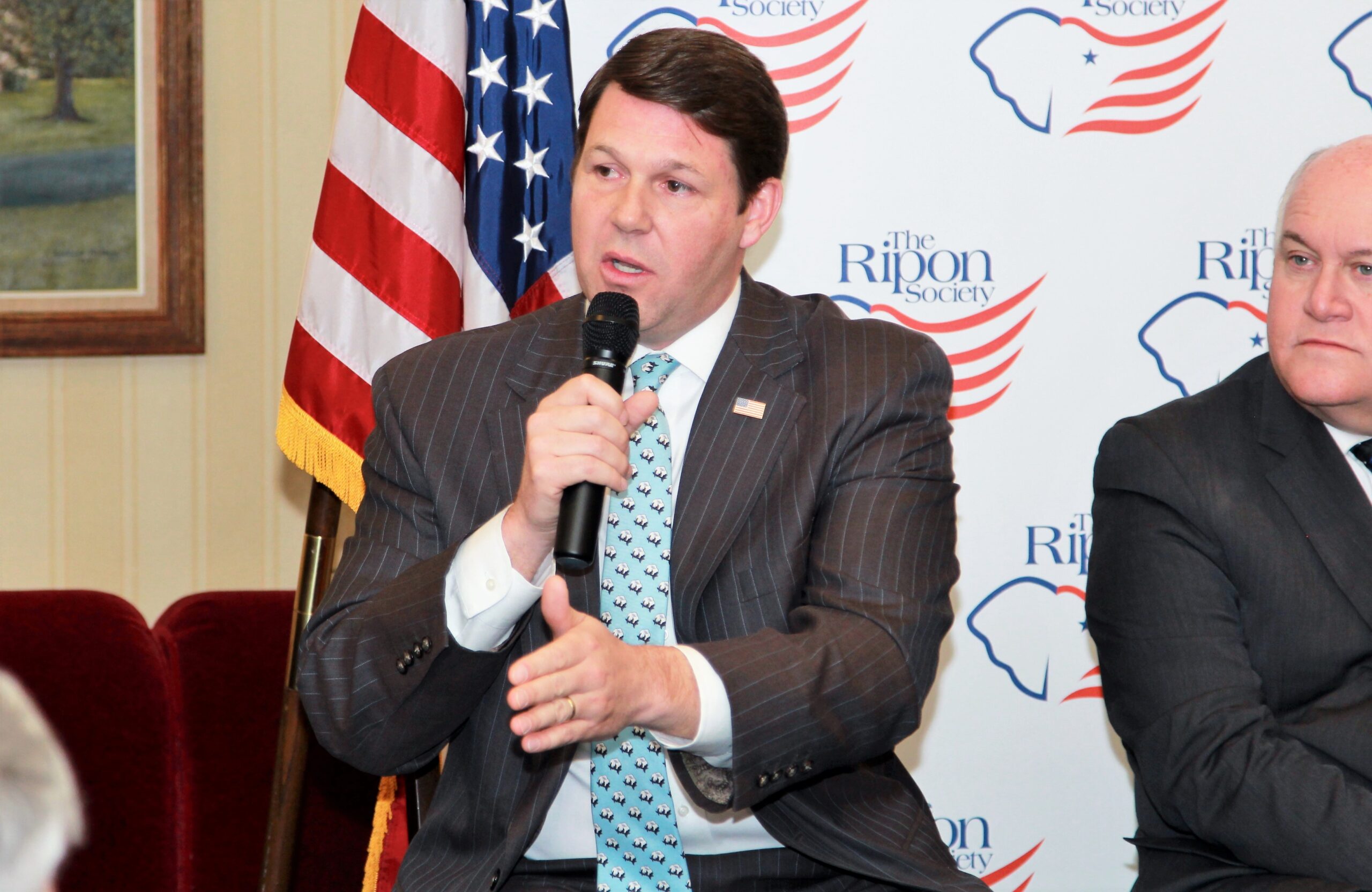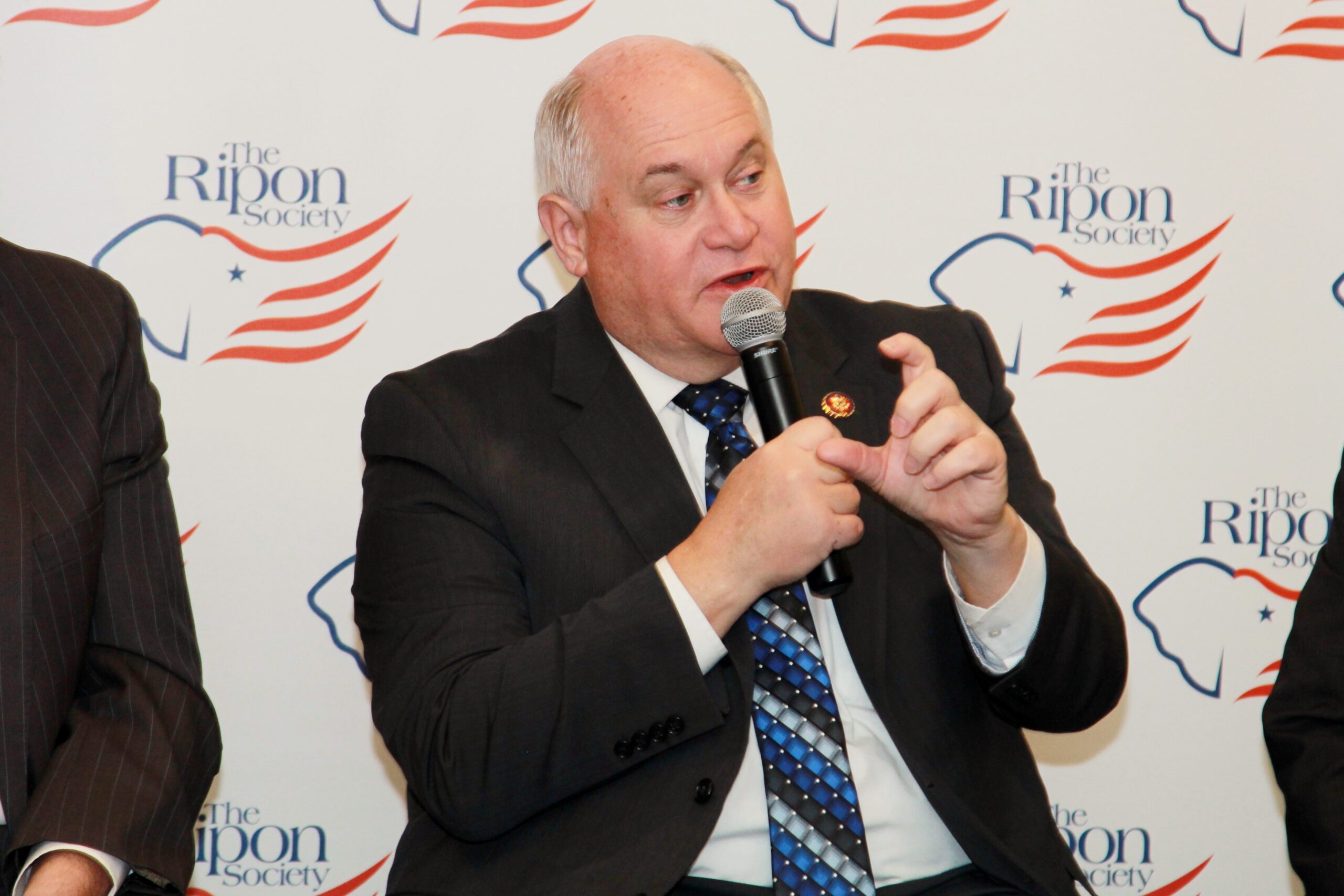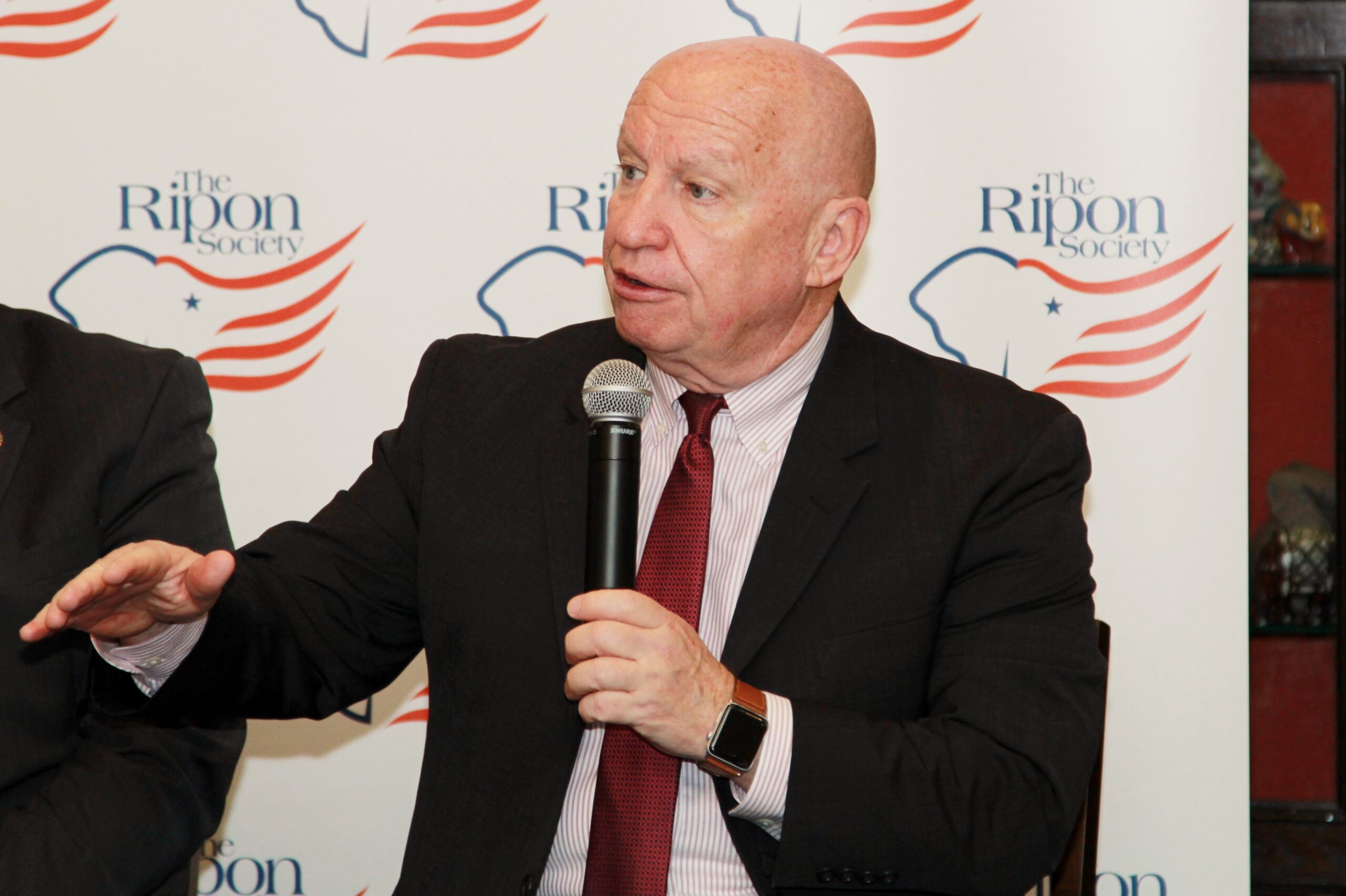 Brady, Arrington & Estes Point to Trade as Key Issue for Country this Year
Brady, Arrington & Estes Point to Trade as Key Issue for Country this Year
WASHINGTON, DC —The Republican leader of the Ways & Means Committee appeared before a breakfast meeting of The Ripon Society last Thursday, delivering remarks in which he introduced two of his panel’s newest GOP members, and discussing some of the key issues they plan to address in the coming year.
The leader is U.S. Rep. Kevin Brady (TX-8). First elected to the House in 1996, Brady served as Chairman of the Ways & Means Chairman for the past two years. As Chairman, he was the principal author and architect of the Tax Cuts & and Jobs Act, a historic plan which reformed the U.S. tax code for the first time since 1986 and was signed into law by the President in December of 2017.
Brady was joined at yesterday’s meeting by U.S. Rep. Jodey Arrington (TX-19) and U.S. Rep. Ron Estes (KS-4). Both Arrington and Estes were appointed to the Ways & Means Committee this past January, and joined Brady to share their own goals and priorities for 2019.

Arrington spoke first.
“We need to get the USMCA passed,” the Texas lawmaker declared. “I’m proud to be on the Whip team, and we’ll work very hard to do that. That is life or death to production agriculture in the great State of Texas.”
Arrington was elected to Congress in 2016. A former aide to President George W. Bush who later served as a Vice Chancellor for Texas Tech University and President of Scott Laboratories, he has built a reputation on Capitol Hill over the past two years as a common sense conservative who listens to the concerns of the people he represents back home.
Those concerns include having a level playing field with China and a federal farm policy that works – two issues he touched on in his remarks.
“I think this President is doing the right thing,” Arrington stated, referring to the Administration’s approach to China. “I might’ve done it a little differently – I might’ve been more targeted and more measured. But you know what? Maybe I would have gotten just targeted and measured results. I’m proud that he’s being bold. We’re hearing very positive things back from him in that process. And if we are able to hit reset and if we’re able to have a fair deal with China, then the future is much brighter for the next generation of farmers and ranchers.”
Arrington also pointed to another issue of concern in his Texas District – health care.
“We have the most rural community hospitals in my 29-county District,” he said. “There are some 2,500 rural hospitals and critical access hospitals, half of which are operating in the red. So we have to figure out a more sustainable model for rural hospitals, and I will be engaged on that front. Anything we can do to provide access to basic care for these rural communities is an important investment for everybody – both urban and suburban areas alike.”
Estes agreed, and opened his remarks by returning to the subject of trade, which he pointed to as one of his top priorities this year.

“When I look at the number one issue for this session,” he stated, “it is trade. From agriculture to our aviation industry to manufacturing in general, that’s the big push that we need to make sure we focus on. Most of our folks were a little apprehensive to open up NAFTA. But I think at the end of the day, we are in a better place now. The USMCA is an improvement over the 20-year-old NAFTA and some of the provisions that needed to be modernized. As Ambassador Lighthizer said earlier this week, it’s a colossal problem if we don’t get USMCA passed.”
Estes was first elected in a special election in April 2017 to fill the seat vacated by Mike Pompeo. He previously served as Sedgwick County Treasurer and then Kansas State Treasurer, and is the only former state treasurer serving in the House. An engineer by training, he also spent years working in the private sector – experience which not only helped him understand how good businesses succeed, but how the heavy hand of government can too often stand in the way of achieving that goal.
In his remarks, he returned to the topic of trade, and how the President’s policy with regard to both the USMCA and China is being viewed by the people he represents in Kansas.
“Our agriculture folks are suffering,” Estes stated matter-of-factly. “And they know they’re suffering. But they’re also saying, ‘this is the right thing to do.’ … They know if we don’t stand up to China now, it’s not going to happen. And so I think it’s important for us as a country to get both of those behind us. China’s going to take a little bit longer than the USMCA. But there are a whole host of other things behind that. We need to come back and look at a larger Asia trade agreement. It may not look exactly like TPP, but we’ve got to do something from that standpoint.”

Brady concurred.
“Before we left last week,” he revealed, “we began with Whip Scalise the work to build support among Republicans for the trade agreement. The normal game plan that will follow is to begin holding, starting next week, briefings with staff throughout the Republican conference, including the whip teams. We’ll follow that with briefings for the members themselves, and begin to work coalition by coalition.”
“Secondly, we’ll identify the areas where there may be some concerns … Identify those, work with the USTR so they can address them, and work with the outside coalition that’s been created to circle back with the members. We don’t yet know what approach the Democrats will use. We think there’s a positive opening here. But in the meantime, while we can’t control them, we can control our support. At the end the day, Republicans will have to provide the bulk of the votes for this agreement.”
For Brady, there is a real sense of urgency on the issue, as well.
“I think this is something that needs to be done this summer,” he stated. “I’m pushing hard for not only the steel and aluminum tariffs to be lifted, but that quotas aren’t imposed on this agreement. This agreement can stand on its own. It’s strong enough, and we don’t need a permanent quota going forward on any of these issues.”
Following their remarks, the lawmakers took a number of questions, including one about the 2017 tax reform bill and the attacks by some Democrats that tax refunds will be smaller this year as a result.
“It is hard to believe we’re having this discussion,” Brady sighed. “And while the Democrats have been fact checked mercilessly on this claim – that lower refunds means you got a tax increase – we know that’s not the case. We also know that refunds vary from year to year pretty dramatically. They also vary within the tax season. Last year, they started out very low, shot very high, and ended up right in the middle almost where expected. I wouldn’t be surprised to see that happening again. So bottom line is we are explaining to a lot of people in America that the refund only reflects what you overpaid the IRS in your paychecks last year.
“90% of Americans will see a tax cut. Another 5-7% will break even or so, and 5% – usually the higher earners in the higher tax states – will see the opposite. But it’s been something we’ve had to deal with, and it is just the ongoing narrative. My frustration is that if the tax refunds had come in higher, the media would be explaining this to the rest of America. Nonetheless, that’s our job to be able to lay out why, at the end of the day, lower refunds simply means you got your tax cut. For most families who work, who live paycheck to paycheck, we designed this to be in your paycheck when you need it – not a year later.”
To view the remarks of Brady, Arrington and Estes before The Ripon Society breakfast discussion yesterday morning, please click on the link below:
The Ripon Society is a public policy organization that was founded in 1962 and takes its name from the town where the Republican Party was born in 1854 – Ripon, Wisconsin. One of the main goals of The Ripon Society is to promote the ideas and principles that have made America great and contributed to the GOP’s success. These ideas include keeping our nation secure, keeping taxes low and having a federal government that is smaller, smarter and more accountable to the people.



